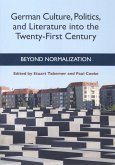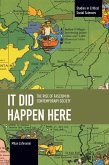From the violent skinhead protests of the early 1990s to the National Socialist Underground murder spree of the 2000s and the KSK (Kommando Spezialkräfte) scandal of 2020, this book traces Germany's long struggle to suppress a resurgent and ever more terroristic far-right scene. Esther Elizabeth Adaire analyses the electoral success of the AfD ( Alternative für Deutschland) party in 2017, the growing presence of PEGIDA on German streets, and the anti-COVID lockdown protests led by conspiracy theorist groups such as Querdenken which have taken aback liberal onlookers for whom Germany's robust culture of Holocaust consciousness is supposed to provide a panacea against neo-Nazism. Adaire examines how, since unification, the intellectual Neue Rechte has increasingly destabilized the foundations of historical memory and lesson-learning in Germany, often doing so in the pages of mainstream conservative publications. Neo-Nazi Postmodern convincingly contends that far-right intellectuals - joined by notable left-wing apostates who brought with them an anti-establishment critique borrowed from the language of postmodernism - have since the early 1990s excused and justified an increasingly violent far-right youth scene, even becoming leaders of this scene themselves. The book therefore traces the development of today's German far-right throughout several stages, notable scandals, and the ongoing destabilization of memory and truth from unification onwards, showing how previously disparate groups such as neo-Nazis, Neue Rechte intellectuals, and political fringe parties merged over time. This far-right scene, Adaire adeptly demonstrates, has come to embody what the historian Walter Laqueur once dubbed 'Postmodern Terrorism': a mixture of cell-based terror structures, reliance on Internet technologies for organizational purposes, and the sowing of epistemic chaos via informational warfare.
Hinweis: Dieser Artikel kann nur an eine deutsche Lieferadresse ausgeliefert werden.
Hinweis: Dieser Artikel kann nur an eine deutsche Lieferadresse ausgeliefert werden.








